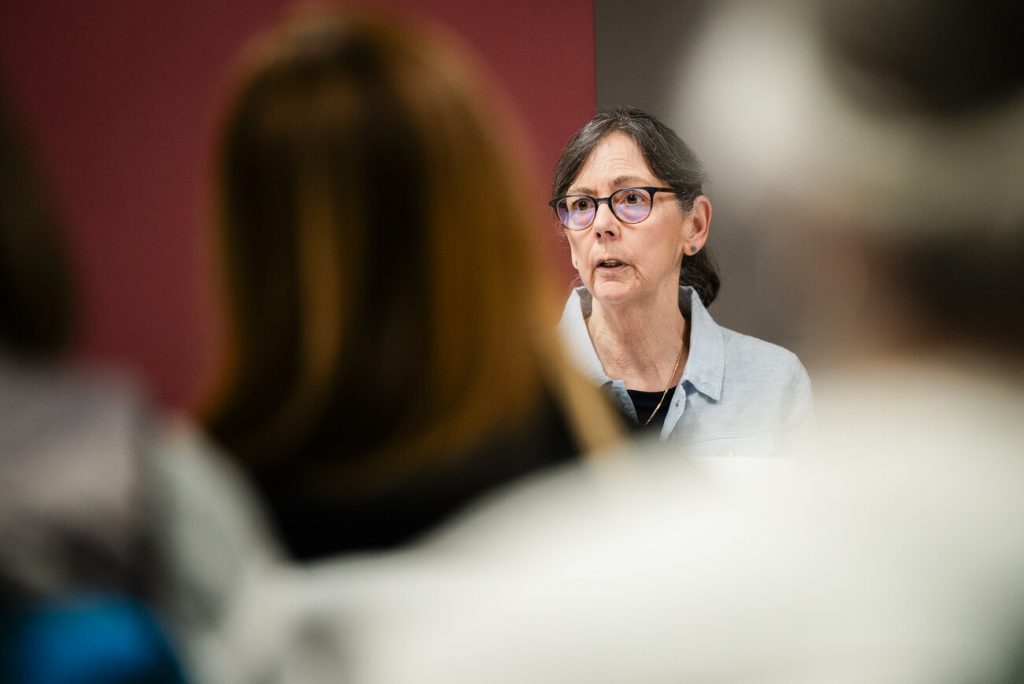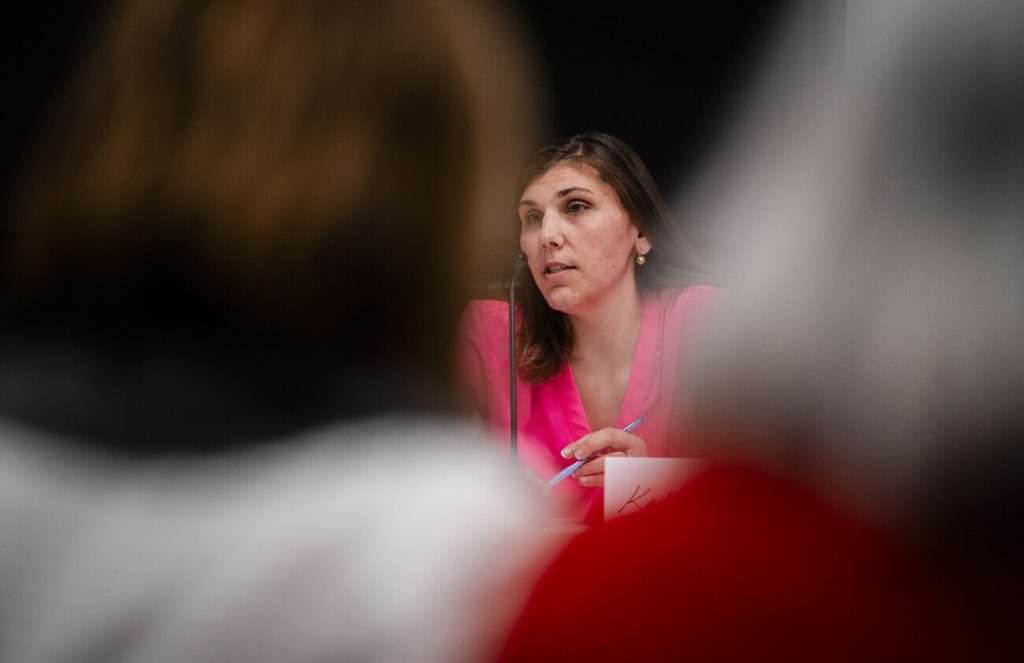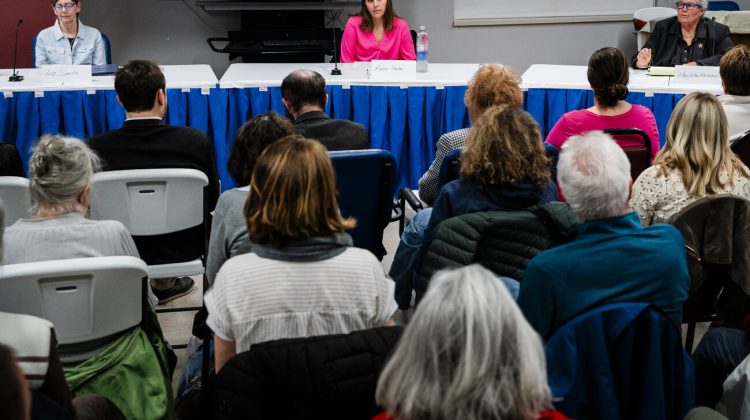SWAMPSCOTT — The Swampscott Democratic Town Committee and Republican Town Committee, in conjunction with The Item, hosted a debate of the Select Board candidates Tuesday evening at the Senior Center.
Community members gathered at the Senior Center to see the three candidates debate the town’s most pressing issues and the solutions each candidate plans to bring to the table.
Incumbent MaryEllen Fletcher, incumbent Katie Phelan, and challenger Liz Smith took the stage to share their approach to the town’s concerns before the election on April 29.
After brief opening statements from the three candidates, they were each asked four questions by moderator Elizabeth Della Piana, with three minutes to respond to each.
The first question was about Swampscott Public Schools’ facing a critical funding need and how further cuts would likely impact staff and core programs. The candidates were asked how they would balance the demand with the needs of other town services.

Smith was the first to respond, saying, “The budget that’s proposed for this year has the largest tax increase in a decade… There are schools that need to be funded in order for us to maintain our reputation for educational excellence. There are safety programs, like police and fire, that need to be funded. I’m really upset that the promised financial summit last summer never took place.”
Next to respond was Phelan, who said, “Many of the Select Board members have come forward with multiple thoughtful ideas on how to close this gap. My colleague Danielle (Leonard) put forward probably 72 different line items that Interim Town Administrator Gino Cresta and Director of Finances Amy Sarro went through. That’s not looking through school line items and saying ‘Here’s where we’re going to cut the school,’ because we value the school did that when they proposed their budget in the first place.”
Last to respond was Fletcher, who said, “I agree with everything Katie said… Now to the summit. Our Town Meeting is at the end of May. If there’s anyone who thought we’d have a summit in the summer, they don’t understand how towns work. It just didn’t happen because we did have a change at town hall… So, if you want to sit there and keep screaming about us not having a summit, it is what it is. I think this budget will come to a good ending; we all have to work together and scrub the budgets, maybe consolidate some staff positions.”
The second question centered on housing options in Swampscott, particularly for seniors on fixed incomes and working families struggling with rising costs.

Phelan was the first to answer this round, saying, “It harkens back to the idea of balance. The tough part about increasing housing is increasing the need for services of whoever sits in those houses. It’s going to be a strain on water and sewer, the schools, whatever costs the town money. We need to be thoughtful about how we introduce housing.”
Next, Fletcher answered, saying, “I just spent the last four days dealing with phone calls from people who live near the new development, the Westcott. The traffic, the impact on construction, the dust and noise, it’s brutal for them. And yet we also need new housing. We have sections of the community that have quite a bit of acreage and a lot of room, and what I would really like to see is if we have tax incentives to see if people can build additional units on their property if possible.”
Smith was last to respond, saying, “We can all agree that Swampscott is very dense. When I go door to door, I’ve knocked on hundreds of doors by now. When I’m in precincts 1 or 2, one thing is mentioned: ‘What about Westcott?’ I know that building, the density and size, and the impact on the neighborhood is a failed process. Something went wrong. And partly because we don’t have the minimum ten percent that we need for affordable housing. Partly because we’re not getting enough community input for the Westcott or Pine Street. I think everyone can agree the process didn’t fall on a good communication process from the get-go.”
The third question asked the candidates if they would consider raising taxes with a possible deficit coming next year.

Fletcher was the first to respond by saying, “We’re going to have a deficit. Not potentially, we’re going to have a deficit, and we’re going to have to raise taxes. The question is how high? The worry shouldn’t be about next year; the question should be about the next four years. That’s why we really need to take our time and scrub the budgets.”
Next to respond was Smith, who said, “We knew this was going to happen, and we didn’t plan for it. We broke down the trust; there’s a lack of trust between Select Board members and the School Committee. That lack of trust has been building these last few years, and it’s really coming to a head. We’re way behind on the process, even without the summit.”
Phelan responded last saying, “What we did this year was all sit at a table together, had a joint meeting where the School Committee presented the budget, and allowed the Finance Committee and Select Board to ask questions. We had a more collaborative process than I have ever seen.”
The final question asked to the candidate focused on the multiple properties purchased by the town that remain unutilized, and if the candidates support the potential purchase of additional properties.
Smith was first to answer, saying, “So, some of those properties are Hawthorn, Archer Street, and I support using the Hawthorne for the purpose it was acquired for. It was stated it would be open space, spending over $300,000 a year to hold on and do nothing with it. We lost a whole year last year without anything looking at it because we were looking at the St. John parking lot, so while that’s a nice dream, it’s not realistic.”
Phelan responded next, saying, “The easy answer is to say absolutely not; we just talked about how bad the budget is, and can’t support our schools, so how could we support other properties? These are once-in-a-lifetime properties that we’ll never see again. Will we ever have the opportunity to have those open spaces… While I’d love to say no, if it’s once in a lifetime, or if there’s state funding or open space, then absolutely a possibility where I’d support that, but I have to understand the impact on taxpayers before I make that decision.”
Fletcher responded last, saying, “I want to buy that parking lot and figure out how we can pay for it. I do believe we can buy it. We’re not 100 percent there, but I’m pretty close. There’s a fund in town, over $350,000, sitting in a fund where we can only use it on property. I spoke with Town Treasurer Patrick Luddy about what it would take to purchase that, and capital operating expenses as far as debt long term.”
After candidates answered the four questions posed by the moderator, they had the opportunity to ask each other a question. Phelan asked her question first and aimed it towards Fletcher.
She asked Fletcher if her primary motivation is a fiscally conservative standpoint and how she balances that with the greater needs of Swampscott.
Fletcher responded, saying, “I wouldn’t classify myself as conservative; I’d say I’m responsible, financially responsible. Maybe a little conservative at times, but more responsible. You have to remember my background is finances; I own my own business, and I’m worried about dollars. That’s who I am. I’d say I’m more focused on having to meet the needs of the community with the limited resources we have.”
Next, Smith posed her question to Phelan, asking her if there was one project that she had as her main focus.
Phelan said, “There’s an amazing project happening right now with DEI in town. We hired a wonderful consultant to help us determine what we really think about ourselves as a community. It’s a really deep, tough question. It’s not the answer that’s important; it’s the process… What I’d like to see is a collaboration between school and town going forward in order to make sure we are putting forward the best versions of ourselves.”
Finally, Fletcher posed her question to Phelan, asking her how she views her role in the consensus of disagreement on the board and what she believes is more important, unity or decision-making.
Phelan responded, saying, “First, I think it’s important to understand that there shouldn’t be a correlation between disagreement and dysfunction. I’ve shown there are ways to have positive disagreements on the board, and we can engage with one another and be honest but open. I think a great example is the UV pilot. I came in with my own opinion, and then I allowed myself to fall into a different vote. I come to the table doing the homework, but I allow my colleagues to point out what I missed or didn’t understand, and I don’t just stand there in my thought and think it’s the only thought that could be thought.”
The debate ended with brief closing statements, and the entirety of the event can be watched on YouTube. Voting for the 2025 election is on April 29.

